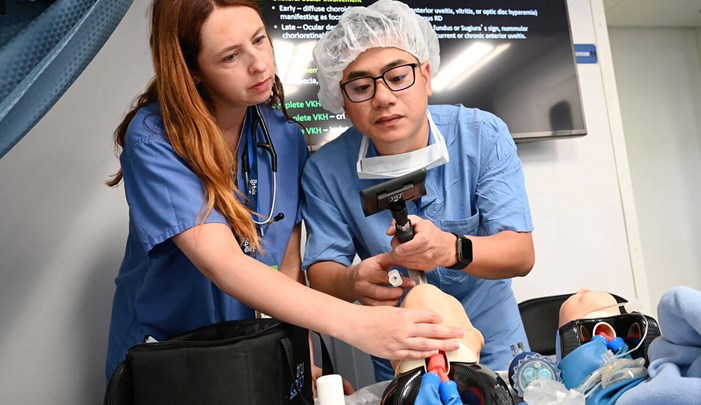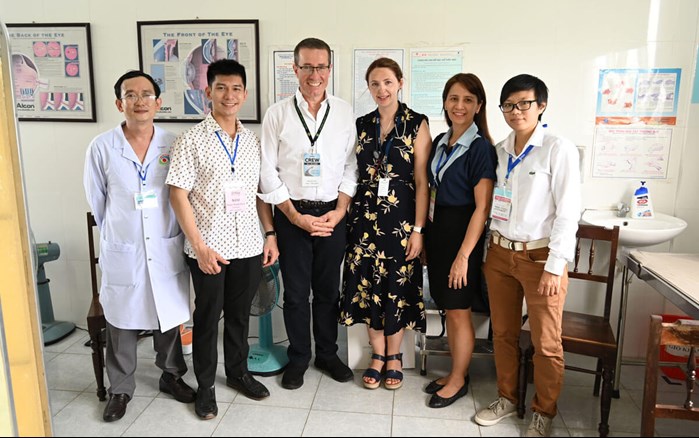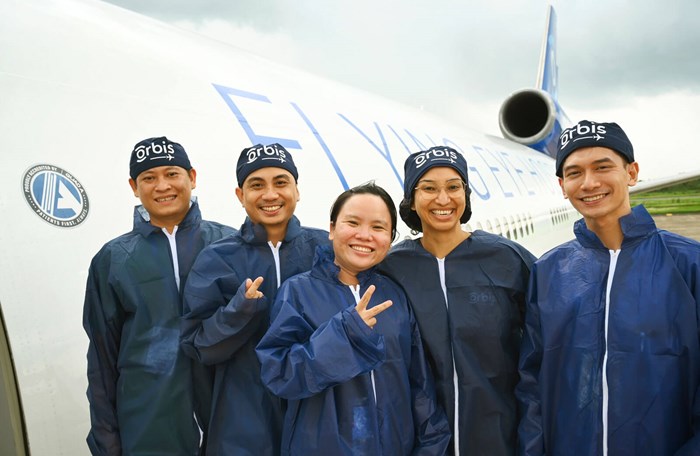The International Day of Friendship (30 July) was a chance to celebrate the bonds between people, countries, cultures and individuals all around the world.
The date was marked by The United Nations General Assembly in 2011 with the idea that friendships have the power to inspire peace, build bridges between communities and bring about a better world where we are all united for the greater good.
Orbis is an international charity working to make eyecare available everywhere, for everyone, so no one experiences the consequences of avoidable blindness. By collaborating with the charity’s partner hospitals and staff, Orbis’ global network of expert medical volunteers conduct training, pass on the knowledge and tools to undertake more complicated procedures, improve surgical outcomes and, most importantly, restore sight to those in need of assistance.

Globally, there are 1.1 billion people who are blind or visually impaired. Ninety percent reside in low- or middle-income countries where eyecare services can be difficult to access. Orbis has a network of 400 volunteer ophthalmologists, nurses, anaesthetists and biomedical engineers from over 30 countries, whose dedication to sharing their skills with eyecare teams around the world helps to improve the level of eyecare for communities for generations to come.
To celebrate International Day of Friendship, two Orbis expert medical volunteers share their thoughts on the importance of friendship to Orbis’ programmes.
Dr. Michelle Le Cheminant is a Consultant Anaesthetist based at the Medical Specialist Group (MSG) in Guernsey. Her roles at the MSG include Vice Chair of Directorate, lead for postgraduate education and lead for paediatric anaesthesia. Michelle has been an Orbis volunteer anaesthetist with Orbis since 2017, joining projects in Vietnam, Mongolia, China and Malawi.

Dr. Michelle Le Cheminant in Huế, Vietnam.
Dr. Nurhayati Lubis is a Consultant Anaesthetist based in Melbourne, Australia, and has been on two projects with Orbis, the first in Quy Nhon, Vietnam, in 2017 and the second onboard the Orbis Flying Eye Hospital in Cần Thơ, Vietnam in 2023.

Dr. Nurhayati Lubis next to the Orbis Flying Eye Hosptial in Cần Thơ, Vietnam.
How important is friendship to Orbis’ programmes?
Michelle: Volunteering with Orbis, I’ve made lifelong friendships with staff, other volunteer faculty and trainees. Arriving at an Orbis project is like being reunited with family and our friendships really support good teamworking.
Nurhayati: Very important. I got involved with Orbis as my friendly colleagues introduced me to the work that Orbis does. I have since made friends through Orbis as it is filled with inspiring like-minded people.
Can you think of a time where you worked with other volunteers, trainees or patients to bring about greater good?
Michelle: In 2019 in Huế, Vietnam, we delivered our first anaesthetic simulation training day, including state-of-the-art training on fibreoptic intubation. This was incredibly well-received and a very different way of learning for many of our trainees. This teaching day required a lot of planning and organisation and was all achieved by good friends working together with a shared vision.
Nurhayati: The nature of anaesthesia means we are always working as part of a team in pretty much all we do. I love how everyone is very much a team player and the focus is on delivering the best care for the patient.
Has your work with Orbis helped to form any friendships?
Michelle: I’ve kept in touch with colleagues who I’ve met on Orbis projects – from staff to trainees and translators. I see Dr Andrew Choyce, Orbis Staff Anaesthetist, as both a friend and a great mentor and during the pandemic we worked closely together on creating content for a comprehensive anaesthetic e-learning programme which is available on Cybersight (Orbis’ free telemedicine training platform).
Nurhayati: I try to stay in touch with as many as I can, especially the local trainees. Social media has made this much easier. The pool of anaesthesia volunteers is also relatively small, and I know quite a few of them by now.
How have these friendships developed over time?
Michelle: Volunteering with Orbis, you make friends from around the world. I keep in touch with everyone on social media and we look forward to catching up in person during the programmes.
Nurhayati: A good example of this is the remote work we did with Cybersight learning modules throughout the pandemic. Although we were not able to meet on the projects, a group of us spent quite a bit of time working together on this – lots of emails and encouraging feedback on each other's effort.
How are these friendships important to you?
Michelle: Friendships built during the Orbis programmes are unique because we all have a shared enthusiasm for training and similar goals. I think this strengthens the bond between friends and makes me value these friendships greatly.
Nurhayati: For me, it’s inspiring to meet like-minded people from all walks of life and at different stages of their career and see how they make it work for their circumstances. I am sometimes the odd one out at work with my focus on doing voluntary work.
How does friendship benefit Orbis’ training programmes?
Michelle: I think friendships support great working relationships and helps teams to go that extra mile to achieve the very best outcomes for our patients.
Nurhayati: I think the support we provide each other especially for the trainees makes a huge difference. Just knowing that there’s a friend you can ask for advice or discuss a difficult case gives you the confidence that you’re providing the best possible care.
How do these friendships benefit your work in the UK?
Michelle: Volunteering with Orbis is a two-way learning process. On every project, I learn something I can take back to my UK practice. Returning from an Orbis project I always feel refreshed and inspired, with a new enthusiasm for my practice.
Nurhayati: Meeting colleagues and friends from all over the world enables you to see how things are done elsewhere and bring it back to our health system. It also encourages positive discussion on best practices and opens my mind to questioning my own practices.
For more information on Orbis and their work visit: www.orbis.org.uk



